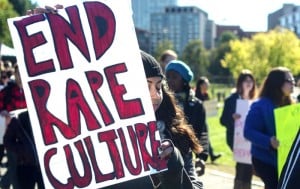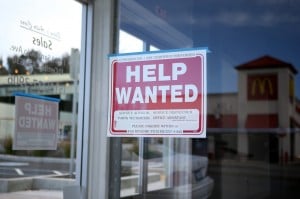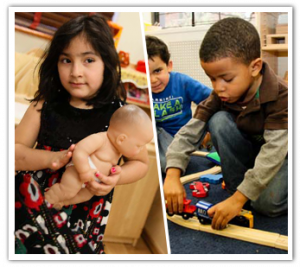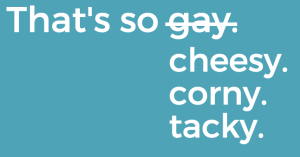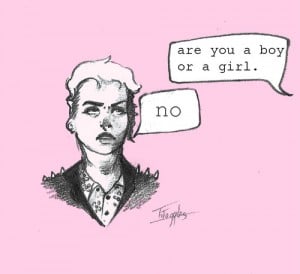
A group of young people smiling and standing in front of a brick building.
When it comes to activism, young people are shaking things up – and it fills me with hope and joy.
A few months ago, I visited my old high school to talk to a group of girls concerned with feminism and equality.
I was bowled over by how thoughtful they were. I was impressed by their awareness of social issues and their understanding of important social justice concepts like rape culture and heteronormativity.
It’s not that I didn’t think high school students were incapable of critical thinking. Far from it. Every day, I see teenaged activists making a positive impact on the world.
But I do remember being in high school only a few years ago, and I wasn’t nearly as conscious of social issues as what they were. I did some kinds of activism, sure – but my understanding of social justice was comparatively limited.
This is probably because feminist ideas weren’t as accessible back then as they are now. More and more people in my country – and around the world – are gaining access to the Internet, which has proven to be a useful platform for activism and the exchange of ideas.
I’m glad that many people in high schools are getting involved in activism, but at the same time, I know that being in high school can be really challenging. Balancing activism with the stresses of a high school environment is really difficult.
There are very few blueprints for high school activists that aren’t patronizing. So, I wanted to share some tips and thoughts for high school students who are also activists.
Please note that this article is specifically aimed at young people in high schools. There are general tips for activism that everyone should heed – learn to check your privilege, practice self-care, be willing to learn from your mistakes, think carefully about “allyship,” practice radical compassion when you can – but I don’t have the space to rehash them all here.
Instead, I want to focus on the issues that specifically affect activists who are at high school. Let’s get right into this.
1. Adultism Is Real – Even Within Social Justice Movements
Adultism is the idea that adults are superior to children and teenagers because of their age.
Adultism is what leads to children feeling silenced. It results in us diminishing their experiences, gaslighting them, and discounting their opinions. It enables the abuse of children.
What’s more is that adultism intersects with other forms of oppression, which makes young people particularly vulnerable to discrimination and systemic injustice.
Teenage girls face a unique kind of misogyny. Queer and trans youth are more likely to face abuse and homelessness. Young people of color are particularly harmed by racism.
It’s a scourge that’s so prevalent in society – even within social justice movements, where I’ve had my rage met with condescension from older activists. So many of my peers have been harmed and patronized by “veteran” activists who don’t realize how harmful their actions are.
Be aware that your activism will be met with adultism, inside and outside of social justice circles.
Sure, you could benefit from listening to the opinions of older, experienced activists. Their advice and perspectives can enrich your worldview. But that definitely doesn’t mean your opinion isn’t valuable, and it certainly doesn’t mean older activists are always right.
Many older people will discount your opinions and experiences, no matter their political views. But it’s important to remember that your age doesn’t determine whether you should be respected or not. It’s difficult not to discount your own views in the face of adultism, but know that it’s bullshit.
Your opinion is valid. Your identity is valid. Your experiences are valid.
2. High School Can Be a Great Place for Organizing
The nature of high school spaces also means that you have plenty of people in one space – a space where people are (hopefully) open to learning, being introspective, and making change.
Meetings are easy to organize when you know the same people will be at the same location every day, at roughly the same time. Messages can easily be passed on through classmates. Practically, it’s a good space for organizing.
But it’s more than that. School is a great place for organizing because schools uphold oppression.
They’re not all like this, and they don’t have to be like this. But the majority of schools have cultures, policies, and practices that are oppressive.
Uniforms and dress-codes can be used to reinforce racism, rape culture, and the gender binary. Sex ed can perpetuate heteronormativity and rape culture. Even well-intended teachers can bring oppression into their classrooms. And this sort of oppression scars students.
For this reason, high school is precisely where activism needs to be.
3. But It Can Come with Challenges, Too
I remember being reprimanded at school for advertising a peaceful protest through our messaging system.
I remember feeling terrified when I was confronted with it. I didn’t think I’d get into trouble for it because it seemed like such a harmless act.
When I walked out of the principal’s office that day, I thought to myself, “If this is how scared I feel now, imagine how I’d feel if I did some kind of protest against the school’s oppressive practices.”
Because of adultism, we’re often seen as disrespectful when we challenge our teachers for perpetuating these ideas. We can actually get in a great deal of trouble for challenging our teachers.
High school teachers have a great deal of power over their students – they can discipline us, they can control our marks, they’re the authority figures in a place where we spend most of our time.
It’s scary – and that fear can make you lose momentum.
But this doesn’t mean that you can’t organize – just that you have to be really thoughtful about how you do it.
Find ways around it. Find ways to protest that don’t break any rules. Break unjust rules, and boycott punishment. Reach out to the media and alumni if your school treats you unfairly.
Don’t let them get away with it.
4. Remember to Conserve Your Energy
When I started getting involved in feminist activism, I heard about “activist burnout.”
Activist burnout is what happens when you give a great deal of emotional, physical, and intellectual energy to activism, but you don’t get the chance to recharge, take care of yourself, and take a break.
We often associate youth with energy, happiness, and enthusiasm, so we think it’s impossible for young people to burn out. For this reason, I thought burnout would never happen to me.
I was wrong.
High school is a stressful space. Many students are overworked and often underappreciated. As I mentioned before, it can be an oppressive space that harms and ridicules marginalized students.
My high school encouraged us to push ourselves to excel in every area of high school. This isn’t inherently bad, but often our teachers praised us for being super involved in high school even when it harmed our mental and physical health.
The competitive culture led to many of us believing we had to overwork in order to be valuable. The environment glorified “burnout culture.”
And my high school isn’t the only one that did this.
This environment, coupled with activism, can be a recipe for burnout.
Teenagers are seldom reminded to take care of themselves – partially because we think young people can’t take care of themselves, and partially because we downplay teenagers’ mental health issues.
I want to remind you that it’s possible for you to burn out. So the ever-important call to practice self-care applies to you, too.
Conserve your energy, get the nourishment you need, and be gentle with yourself.
5. Your Work Is Important
When I was a teenage girl, I definitely needed to be more conscious of social justice.
If I knew then what I know now, I would have been able to work through the internalized misogyny that hindered my development and healing. I would have been able to tackle self-blame after my rape, and I would have been able to accept my queer identity sooner.
Getting to university and learning about social justice gave me hope and helped me to heal. But you know what? If I understood privilege and heteronormativity earlier, I would’ve had a happier adolescence. I would have inflicted less harm on myself and others.
High school activists, the work you’re doing is important.
You’re changing the views of your peers.
You’re impacting the world around you.
And very importantly, you’re affecting change within yourselves.
Never underestimate the importance of the work you do – a little bit of education, rallying, and protesting can go a long way in changing mindsets.
And ultimately, changing minds is how we change the world. So don’t stop doing it.
[do_widget id=’text-101′]
Sian Ferguson is a Contributing Writer for Everyday Feminism and full-time freelance writer based in South Africa. Her work has been featured on various sites, including Ravishly, MassRoots, Matador Network, and more. She’s particularly interested in writing about queer issues, misogyny, healing after sexual trauma and rape culture. You can follow her on Twitter and Instagram. Read her articles here.
Search our 3000+ articles!
Read our articles about:
Our online racial justice training
Used by hundreds of universities, non-profits, and businesses.
Click to learn more





